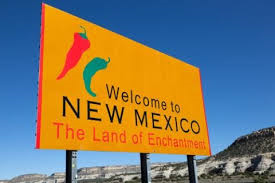
Public land managed by New Mexico will help the state to expand renewable energy development with the intent of lowering carbon emissions now that House Bill 95 has been signed into law. The legislation also codifies the Office of Renewable Energy within the State Land Office.
In 2019, Commissioner of Public Lands Stephanie Garcia Richard established the Office of Renewable Energy within the State Land Office. Over the last four years, the agency has increased annual revenue from wind and solar power generation to over $12 million in fiscal year 2022 and more than tripled the amount of energy under lease, according to a state press release.
“With abundant wind and solar resources at our disposal across the state, it would be foolish not to aggressively pursue renewable energy development. Thanks to this legislation, New Mexico is now well-positioned to be a national leader in this booming sector,” said Commissioner Garcia Richard. “The fact that we were able to triple renewable energy on state lands in just a few short years shows that there is a strong appetite for growing the industry in the state.”
That money goes to statutory beneficiaries of State Trust land, including public schools, universities and hospitals.
Records show there were 27 active leases on State Trust land as of March 9, with a total capacity of 1,556 megawatts, mostly in central New Mexico. That’s enough to power about 320,000 homes. The land office also reported 12 active solar power leases with a capacity of 274 megawatts, enough for about 54,700 homes.
Solar leases were mostly listed in southern New Mexico, in Doña Ana, Otero, Eddy and Lea counties, with other leases further north in Bernalillo, McKinley and San Juan counties.
Despite seemingly in transition to renewable energy sources, New Mexico is the second-highest oil-producing state in the U.S. and relies on the energy industry for about a third of its budget.
Sen. William Sharer (R-1) of San Juan County argued against the bill. He contended oil and gas revenue equates to “a million dollars an hour” while the $12 million brought in in FY 2022 by renewables was only “a million a month.”
“We ought to be giving a little more love to the people that are paying a million dollars an hour,” said Sharer. “But I don’t wish to degrade wind, solar, geothermal or anything else. We should be an all-of-the-above package. I just want to make sure that we all here know a million dollars a month versus a million dollars an hour.”






